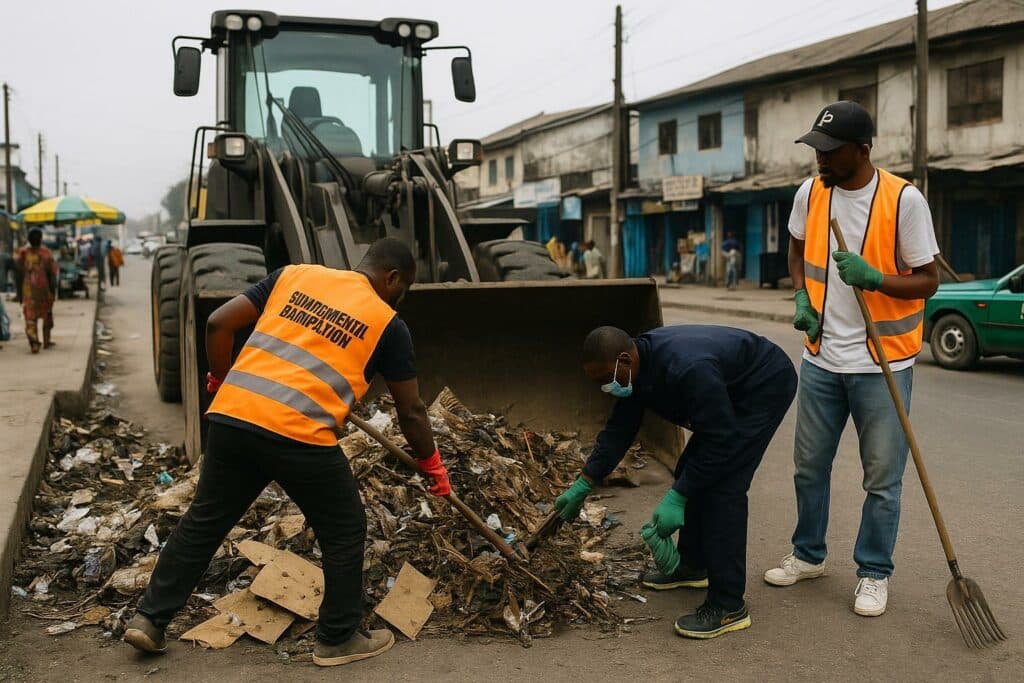A concerted sweep across the capital
At dawn on 21 October, the usually congested Avenue de la Paix resonated not with the roar of minibuses but with the steady cadence of bulldozers and Caterpillar trucks. The logistics group of Congo-Brazzaville’s internal security forces, drawing on both police and gendarmerie personnel, initiated a sweeping operation that has already altered the visual and olfactory landscape of the capital. Piles of refuse that had become quasi-permanent features of neighbourhoods from the school of Grand Fleuve to the populous district of Talangaï were loaded onto lorries, gutters were unclogged, and stagnant water released.
Security forces take up brooms and bulldozers
The deployment combined the discipline of uniformed units with the technical expertise of the groupement logistique. Officers traded riot shields for shovels, illustrating a multifaceted conception of public security that extends to environmental health. Caterpillars levelled informal dumpsites, while gutter-cleaning teams worked methodically to restore drainage channels whose obstruction routinely exacerbates flooding during the long rainy season. By the evening, more than a dozen lorry-loads of waste had left the streets, according to supervisors on site.
Towards a strategic public hygiene plan
Commanders involved in the project framed the clean-up as only the opening phase of a broader Special Urban Sanitation Plan. In the coming days the same model is expected to be replicated in other arrondissements, with schedules designed to minimise disruption to traffic and commerce. Senior officers underlined that the initiative dovetails with national ambitions to modernise the capital’s image and to reinforce preventive public-health measures. Their rhetoric insists on complementarity rather than substitution: security forces act as a catalyst, but the ultimate aim is to embed routine waste management within municipal structures.
Communities voice relief and hope
The most immediate verdict came from residents surprised to find that long-clogged canals were once again free-flowing. “It is a good thing. We hope it will continue regularly,” affirmed a shopkeeper from Mikalou, echoing a sentiment repeated along the clean-up route. Parents expressed relief that children no longer have to maneuver around overflowing bins on their way to class, and informal street vendors reported a noticeable uptick in foot traffic as thoroughfares regained their width. Such attitudinal shifts hint at a social dividend that may outlast the mechanical removal of waste.
Environmental stakes and civic duty
Behind the operational choreography lies a sober environmental equation. Uncollected refuse feeds vector-borne diseases and degrades waterways that ultimately flow into the Congo River. By front-loading the effort with uniformed personnel, the State underscores that environmental negligence is a matter of collective security, not merely municipal housekeeping. Authorities simultaneously issue a reminder that the success of the campaign hinges on behavioural change—household sorting, timely disposal and community vigilance—to prevent a relapse into unsanitary habits.
À retenir
More than a logistical exercise, the clean-up signals a refreshed contract between citizen and State in which security forces serve as guarantors of both physical safety and environmental well-being. The resonance among residents suggests fertile ground for a sustainable sanitation culture.
Le point juridique/éco
Congolese public-health regulations already impose fines for illegal dumping, yet enforcement has historically been sporadic. By placing security forces at the vanguard, the government amplifies deterrence while keeping within the bounds of existing legal frameworks that empower police to act in matters of public safety. Economically, early removal of waste reduces downstream costs linked to flood damage and disease outbreaks; economists within the Ministry of Finance argue that preventive sanitation yields a favourable cost-benefit ratio compared with emergency interventions. Hence the operation could prefigure a recalibration of the urban budget, allocating greater resources to routine waste logistics while preserving the State’s fiscal prudence.

